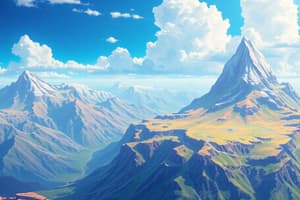Podcast
Questions and Answers
Which branch of geography examines human activities and cultures?
Which branch of geography examines human activities and cultures?
- Environmental Geography
- Geospatial Technologies
- Human Geography (correct)
- Physical Geography
Absolute location refers to a position relative to other places.
Absolute location refers to a position relative to other places.
False (B)
Name one type of region defined by common features.
Name one type of region defined by common features.
Formal Region, Functional Region or Vernacular Region
The study of how humans adapt to and modify their environment is known as ______.
The study of how humans adapt to and modify their environment is known as ______.
Match the following geographic concepts with their definitions:
Match the following geographic concepts with their definitions:
Which of the following is NOT a climate zone?
Which of the following is NOT a climate zone?
Geospatial Technologies include GIS and GPS.
Geospatial Technologies include GIS and GPS.
What are the physical features studied in Physical Geography?
What are the physical features studied in Physical Geography?
Areas that are defined by official boundaries, such as countries, are known as ______ regions.
Areas that are defined by official boundaries, such as countries, are known as ______ regions.
In Human Geography, which aspect relates to population changes?
In Human Geography, which aspect relates to population changes?
Which of the following is NOT a type of map?
Which of the following is NOT a type of map?
GIS stands for Geographic Information Systems.
GIS stands for Geographic Information Systems.
What term describes the lines measuring distance north or south of the equator?
What term describes the lines measuring distance north or south of the equator?
The __________ is a 3D representation of Earth.
The __________ is a 3D representation of Earth.
Which of the following best describes sustainability?
Which of the following best describes sustainability?
Match the following terms with their definitions:
Match the following terms with their definitions:
Remote sensing involves collecting data about Earth using ground-based instruments.
Remote sensing involves collecting data about Earth using ground-based instruments.
Name one natural hazard that geographers study.
Name one natural hazard that geographers study.
The __________ impact of human activity on global climates is referred to as climate change.
The __________ impact of human activity on global climates is referred to as climate change.
Flashcards are hidden until you start studying
Study Notes
Key Concepts in Geography
-
Definition of Geography: The study of the Earth's landscapes, environments, and the relationships between people and their environments.
-
Branches of Geography:
- Physical Geography: Focuses on natural features (landforms, climate, vegetation).
- Human Geography: Examines human activities, cultures, and their impact on landscapes.
- Geospatial Technologies: Includes GIS (Geographic Information Systems), remote sensing, and GPS (Global Positioning System).
Major Geographic Concepts
-
Location:
- Absolute Location: Exact coordinates (latitude and longitude).
- Relative Location: Position relative to other locations.
-
Place: Characteristics that make a location unique (physical and human attributes).
-
Region: Areas defined by common features (cultural, political, physical).
- Types of Regions:
- Formal Regions: Defined by official boundaries (countries, states).
- Functional Regions: Defined by a function (economic area, urban areas).
- Vernacular Regions: Perceived regions (the South, Middle East).
- Types of Regions:
-
Movement: How and why people and goods move from one place to another (migration, trade).
-
Human-Environment Interaction: Ways humans adapt to and modify their environment.
Physical Geography Features
-
Landforms:
- Mountains, hills, plateaus, plains, valleys, deserts.
-
Water Bodies:
- Oceans, seas, rivers, lakes, wetlands.
-
Climate Zones:
- Tropical, arid, temperate, polar.
-
Ecosystems:
- Biomes like forests, grasslands, deserts, tundras.
Human Geography Features
-
Population and Demographics:
- Population density, distribution, migration patterns.
-
Culture:
- Language, religion, ethnicity, customs.
-
Economy:
- Types of economies (agricultural, industrial, post-industrial), globalization.
-
Urban Geography:
- Study of cities, urbanization, city planning.
Tools of Geography
-
Maps:
- Types include political, physical, topographic, thematic.
-
Globes: 3D representations of Earth.
-
GIS: Software for mapping and analyzing spatial data.
-
Remote Sensing: Collecting data about Earth from satellites or aircraft.
Environmental Geography
-
Sustainability: Balancing human needs with environmental protection.
-
Climate Change: Impact of human activity on global climates.
-
Natural Hazards: Study of earthquakes, floods, hurricanes, and their geographical implications.
Key Geographic Terms
- Latitude: Lines measuring distance north or south of the equator.
- Longitude: Lines measuring distance east or west of the Prime Meridian.
- Topography: The arrangement of natural and artificial physical features of an area.
These notes cover fundamental aspects of geography, aiding in the understanding of both physical and human geographic elements.
Definition and Branches of Geography
- Geography studies the Earth's landscapes, environments, and the interactions between people and their surroundings.
- Physical Geography: Investigates natural features including landforms, climate, and vegetation.
- Human Geography: Analyzes human activities, cultures, and their effects on landscapes.
- Geospatial Technologies: Encompasses tools like GIS (Geographic Information Systems), remote sensing, and GPS (Global Positioning System).
Major Geographic Concepts
- Location:
- Absolute Location provides exact coordinates (latitude and longitude).
- Relative Location describes the position concerning other places.
- Place: Unique characteristics that define a location, including both physical and human attributes.
- Region: Areas distinguished by common features such as cultural, political, or physical traits.
- Formal Regions: Have official boundaries (e.g., countries).
- Functional Regions: Defined by specific functions, like economic areas or urban centers.
- Vernacular Regions: Perceived regions based on common cultural identity (e.g., the South).
- Movement: Examines how and why people and goods travel, involving migration and trade.
- Human-Environment Interaction: Explores human adaptations and modifications to the environment.
Physical Geography Features
- Landforms: Includes mountains, hills, plateaus, plains, valleys, and deserts.
- Water Bodies: Encompasses oceans, seas, rivers, lakes, and wetlands.
- Climate Zones: Classified into tropical, arid, temperate, and polar zones.
- Ecosystems: Diverse biomes such as forests, grasslands, deserts, and tundras.
Human Geography Features
- Population and Demographics: Studies population density, distribution, and migration trends.
- Culture: Considers language, religion, ethnicity, and customs.
- Economy: Examines types of economies (agricultural, industrial, post-industrial) and globalization effects.
- Urban Geography: Focuses on the study of cities, urbanization processes, and city planning.
Tools of Geography
- Maps: Include various types such as political, physical, topographic, and thematic maps.
- Globes: Three-dimensional representations of the Earth.
- GIS: Specialized software for mapping and analyzing spatial data.
- Remote Sensing: Method of gathering Earth data using satellites or aircraft.
Environmental Geography
- Sustainability: The practice of balancing human needs while protecting the environment.
- Climate Change: Investigates human impacts on global climate patterns.
- Natural Hazards: Studies geographical implications of events like earthquakes, floods, and hurricanes.
Key Geographic Terms
- Latitude: Lines indicating distance north or south of the equator.
- Longitude: Lines denoting distance east or west of the Prime Meridian.
- Topography: Describes the arrangement of natural and artificial features in a region.
Studying That Suits You
Use AI to generate personalized quizzes and flashcards to suit your learning preferences.




